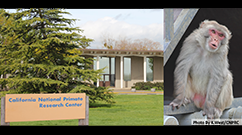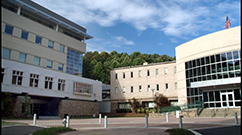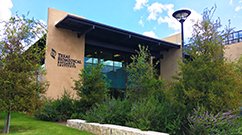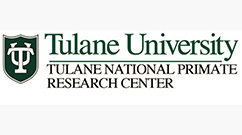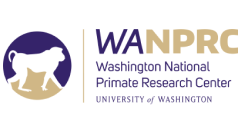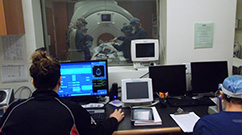National Primate Research Centers Consortium
Overview
The primary goal of the National Primate Research Center (NPRC) program is to facilitate the effective use of nonhuman primates (NHPs) by scientists engaged in biomedical research. The NPRC program complements and enables the missions of the other NIH Institutes and Centers (ICs) by providing the animals, facilities, expertise, and resources required to enable NHP research in specific disease areas. ORIP’s Division of Comparative Medicine (DCM) funds seven NPRCs, which are centralized facilities in various parts of the country and are available to investigators on a national basis. Individual NPRCs have specific areas of emphasis, but each is expected to provide a variety of services both individually and through inter-NPRC collaborations to a wide range of investigators. The majority of researchers who use the NPRC physical and intellectual infrastructure are funded by the U.S. Public Health Services, particularly NIH ICs. The NPRCs also support research funded by other federal agencies, non-profit foundations, and the private sector. Each NPRC has a Pilot Research Program, which is advertised nationally and available to investigators who propose the use of NHPs in developmental projects in biomedical research or for studies enhancing the welfare or husbandry of NHPs. For additional information on the seven NPRCS, see the links below or visit the NPRC Research and Capabilities website. Additional information is available on NPRC Access Criteria and Procedures.
NPRC Access Criteria and Procedures
NPRC facilities and resources enable NPRC staff scientists and investigators from the host institution and others across the country to collaborate on their research projects. The centers' specialized resources are intended to support investigators who receive their primary research project funding from NIH, but they also may be used by investigators who are funded by other federal, state, and local agencies, as well as by research foundations and the private sector.
Each NPRC has a Visiting Scientist Program that offers advanced training and research in NHP biology. Collaborative arrangements between investigators and center scientific staff are encouraged and can be developed on studies related to major human diseases, subject to the availability of resources. NHP blood samples, organs, and biological fluids are available through the NPRCs. The following standardized criteria and procedures have been implemented at each NPRC to facilitate utilization of center resources:
Access Criteria
- The nature and scope of the proposed research must be best conducted with NHPs and be compatible with available center resources.
- The proposed research must have high scientific merit as determined by peer review.
- NIH-funded research takes precedence over research activities funded by other sources.
- Grants must contain appropriate budgets for the NPRC portion, including animal per diem costs.
- Availability of NPRC resources, including animals, space, research services and support, and special requirements—such as biosafety facilities—are also limiting factors that must be considered by the investigator.
- When moving animals into or out of NPRCs, all applicable local, state, and national guidelines must be followed to prevent any contamination of animals (e.g., viral, microbial).
Access Procedures
- An initial research proposal must be submitted by the researcher to the NPRC prior to submitting an application for funding. The director then consults with the research services, veterinary, and colony management staff members at the center to assess resource availability and project feasibility.
- When resource availability and project feasibility have been established, the NPRC staff will provide budget information to the researcher regarding the center costs to be included in the formal research proposal.
- The scientific merit of the proposal must then be evaluated through the NIH peer review process or through a similar process at other agencies. However, small pilot projects with other funding sources may be considered. In the latter case, the peer review is conducted by the NPRC Research Advisory Committee.
- In addition to the scientific peer review, a protocol approved by the Institutional Animal Care and Use Committees (IACUC) at both the investigator's institution and the NPRC must be in place. Protocols must also be established to address biosafety concerns.
- When the investigator has received notification of funding, the NPRC director or designee should be advised immediately so that the resources at the center may be reserved for the funded proposal.
- Biological materials, such as blood samples, organ tissues, and biological fluids, can be obtained by contacting the appropriate staff at the NPRCs.
All publications resulting from research conducted at or with NPRC resources must bear an appropriate acknowledgment of ORIP support, including the P51 base grant number.
Frequently Asked Questions
Please see below for a list of frequently asked questions on animal requesting and allocation procedures at the NPRCs. A webinar on this topic is also available.
Q: What is the best time to submit a request for NHPs to the NPRCs?
A: The best time to submit a formal NHP request is once the grant application has been approved for funding, although it can be useful to discuss availability and receive guidance from the NPRCs beforehand.
Q: How do I request NHPs?
A: NPRCs have either a contact email or a form to fill out directly on each of their websites. This website has each NPRC’s contacts. Forms at each NPRC ask for similar information regarding the request, such as the number of animals, species, sex, age, weight, or other required characteristics. The forms also ask for the expected funding source of the project. If the study is to be done at an NPRC, the forms also request more information about what resources are needed, such as imaging capabilities of particular tissues or organs, or biosafety level facilities.
Q: What are the contacts for each NPRC to request animals?
A: Please see this website for each NPRC’s contacts. Click on the “Information Regarding Initiation of Research” link under each NPRC.
Q: What is the range of time to review the initial request?
A: Reviewing the initial request can range from 7 days to about a month, depending on the complexity of the request and whether the Research Advisory Committee (RAC) reviews the request at this stage. The RAC at each NPRC advises on the allocation of animals and resources to projects. The timing of the RAC review in the allocation process varies by center and may also depend on whether the project has undergone review at the funding agency, such as NIH peer review.
Submission of the initial request to an NPRC is followed by a discussion with the investigator about the resources needed, the specifics of the animals requested, and what aspects of the request are essential versus more flexible. Communication between the investigator and the NPRC allows for discussion of the expected timing of the study, as well as whether an onsite collaborator or veterinarian is needed if any portions of the study will be conducted at the NPRC. If a request is approved and the project is funded, it goes to the NPRC’s allocation process.
Q: What is the animal-allocation process like?
A: The grant must be awarded (funded), and approval from the Institutional Animal Care and Use Committee must be in place at the institution where the study will be conducted before the request goes through the allocation process. Moreover, if the project is not reviewed by NIH, such as for a pilot study or a non-NIH study, it must go through Research Advisory Committee review.
After these steps, the request is evaluated according to the standards set by NIH, in which priority is given to NIH-funded extramural grants, followed sequentially by NIH-funded intramural projects; other federal or state funding; nonprofit or not-for-profit entities; and commercial entities, such as projects funded by pharmaceutical companies. Allocation of animals to for-profit entities, such as pharmaceutical companies, requires an additional approval by NIH. Within each priority category, the allocation is in the order that the request was received. In addition to the order in which requests are received, there are other factors beyond funding source that affect allocation, as addressed in the questions below.
Q: What are the allocation priorities?
A: As noted above, the top priority is given to NIH-funded extramural projects, followed sequentially by NIH intramural projects; other federal- or state-funded projects; nonprofit or not-for-profit entities; and projects funded by for-profit entities, such as pharmaceutical companies. Most animal requests to the NPRCs are funded by NIH. The allocation process is implemented separately at each NPRC because centers specialize in certain NHP species and in technical capabilities (e.g., specific assays, types of imaging, biosafety facilities).
Q: Can I put in a request that automatically goes to all seven centers?
A: The NPRCs are unable to process one central request across the seven host institutions at present, although such a system could be considered going forward. Currently, each center keeps track of its own list of requests and matches them to its available NHP species and technical capabilities, such as assay services or imaging facilities. However, the NPRCs refer investigators to another NPRC if there is a better match for the requested animals and/or research capabilities.
Q: Is any advantage given to specific research areas?
A: HIV/AIDS projects are given priority for the animals in animal colonies that are specifically supported by the NIH Office of AIDS Research along with ORIP. These resources are specifically intended for HIV/AIDS research. Apart from that, there is no advantage given to specific research areas.
Q: What other factors impact the order in which animals are allocated to projects, in addition to the order in which the request was received?
A: Animal characteristics can significantly impact how long it takes to fulfill a request. The more animal attributes the request entails, the more difficult it may be to fill. For example, requesting animals of a specific species, age, sex, weight, and specific-pathogen-free (SPF) and research-naïve status may delay allocation. It will take time to identify sufficient animals with such a detailed set of characteristics, especially if they are already in high demand, such as SPF, young adult, research-naïve rhesus macaques.
Q: Is there any way I can speed up the allocation of my requested animals?
A: Be as flexible as possible in the request. For example, do the animals all have to be 3–5 years of age? Must they all be research naïve, or would it be acceptable if they have participated previously in a short study? Being open to staggering assignments over time also helps, rather than requiring the entire cohort at once. Requests can more easily be filled in several batches as animals become available.
Other factors that can affect animal assignments are infrastructure availability, such as if the project requires space allocation in a biosafety facility, which may be limited and in high demand. Similarly, animals that will be shipped require indoor cage space to be tested and screened before being sent out. Scheduling shippers also takes time. Short-term studies conducted at NPRCs are quicker to fill. Projects that require infants and females also delay assignments because there are fewer of these available; females cannot be pregnant, unless this is part of the request. The fact that rhesus macaques are seasonal breeders also affects the availability of females, as well as infants.
Q: What is the production rate of the colonies?
A: This is variable, but generally around 75% of breeding female rhesus macaques produce offspring. Young adult rhesus macaques would be available 3–5 years after birth. However, not all of these will be available for assignment because some must be held back as breeders, especially females and animals that maintain the social stability of the group.
Q: What is the average timeline for filling a request?
A: It depends strongly on the characteristics of the animals being requested. The time to fill a request at the NPRCs ranges from 1 month to 2 years. The average time to begin to fill a request is 3–6 months, but as mentioned above, not all animals may be allocated at once, depending on availability.
Q: What proportion of macaques is assigned to internal versus external investigators?
A: About half of the animal assignments are to internal investigators at the NPRCs and/or at the host institution (51%). The other half of the assignments (49%) are to external investigators—that is, those not affiliated with the NPRCs or with the host institution. Note that some external investigators contract with an NPRC to have the data collection done at the NPRC, rather than shipping the animals out. These animals are counted as being allocated to external investigators even if the animals do not leave the NPRC.
Q: Does every NPRC have a pilot project program?
A: Yes. Please contact each NPRC directly about this so that they can provide further information about their pilot project programs.
Q: How can I find out which specific types of imaging technologies or other research services are offered at each NPRC?
A: Each NPRC offers advanced imaging facilities and many other capabilities. Please see this chart showing the availability of the wide range of research capabilities at each center.
Q: What happens to an NHP request at the NPRCs if an investigator resubmits a grant application?
A: Investigators should contact the NPRC again to update the request for the resubmission because aspects of the grant application may have changed (e.g., adding another control group or otherwise improving the experimental design). Similarly, the investigator’s budget may need to be modified due to changes in animal costs and per diem rates. Recontacting the NPRC is also advisable to determine the expected availability of animals with the specific characteristics required by the applicant’s project. There can be a delay of about 1 year between the initial submission of a grant application to a funding agency and the resubmission, and many parameters may have changed during that time.
Inquiries
For additional information about the Visiting Scientist Program and resources available at a specific center, including applying to utilize a center's resources, contact the center director or appropriate contact person listed in this directory.




